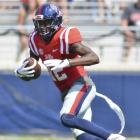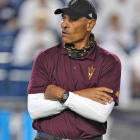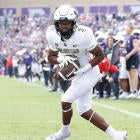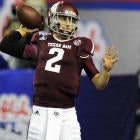The final day of SEC spring meetings in Destin, Florida, was loaded with news on the transfer front. Presidents voted on Friday that players who have received their degrees from SEC schools can move within the conference and play right away, without the need for a waiver. In addition to the graduate transfer rule, the SEC also passed a rule that allows players on teams facing NCAA sanctions to move within the conference without sitting out.
The graduate transfer rule was first proposed by Georgia during spring meetings in 2017, on the heels of its rather public fight with Alabama for defensive back Maurice Smith in the summer of 2016. Smith, a former defensive back for the Crimson Tide, played for Georgia without sitting out despite Alabama's effort to make him ineligible. Public outcry poured in on Alabama, and eventually Smith got a waiver to play immediately for then first-year Bulldog coach Kirby Smart.
Since the rule was tabled last year, running back David Williams went from South Carolina to Arkansas with a waiver, and defensive back Nick Harvey announced his move from Texas A&M to South Carolina earlier this offseason.
The new rule, which is effective immediately for players not currently enrolled at their new institutions, is big news for former Alabama offensive lineman Brandon Kennedy. The recent graduate unsuccessfully appealed to Alabama for immediate eligibility in the SEC, but can now move freely -- with Tennessee and Auburn both reportedly interested in his services.
The new legislation that allows players to leave teams facing NCAA sanctions was co-sponsored by Florida and Texas A&M. Why Florida? Because it could help them in 2018.
Wide receiver Van Jefferson, formerly of Ole Miss, enrolled at Florida for spring semester and participated in spring drills with the Gators in the hopes of playing for first-year coach Dan Mullen. While he still has to get a waiver from the NCAA to play right away, six other former Ole Miss undergraduates -- including Michigan quarterback Shea Patterson -- got those releases due in part to Ole Miss working with their new institutions.
"A kid, if he goes there and he gets caught up in doing something that is not of his doing, he should not be punished for something that the school did wrong, and he outta have the ability to go out," new Texas A&M coach Jimbo Fisher said, according to the Orlando Sentinel. "I know that's controversial, but those kids only have a four-year window. Why would they be punished if they weren't involved in the scandal or the situation?"
It won't necessarily be that easy for players on teams facing NCAA institutions in the future, though. Teams and coaches can still block undergraduates from transferring to specific schools for now, but that could change later this summer when the Division I Council meets with the transfer working group.





















